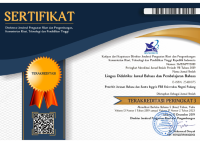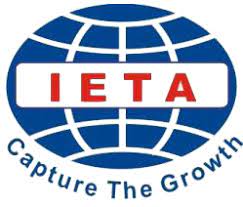Does the Fix- Up Strategy Affect Indonesian EFL Learners’ Reading Comprehension?
 ), Irnasari Irnasari(2), Saiful Akmal(3),
), Irnasari Irnasari(2), Saiful Akmal(3), (1) IAIN Takengon
(2) IAIN Takengon
(3) UIN Ar-Raniry
 Corresponding Author
Corresponding Author
Copyright (c) 2022 Lingua Didaktika: Jurnal Bahasa dan Pembelajaran Bahasa
DOI : https://doi.org/10.24036/ld.v16i2.120014
Full Text:
 Language : en
Language : en
Abstract
Gaining comprehension when reading has become a challenge for students in EFL context. The present study was undertaken to deal with the hardship that EFL learners confront in their reading class. A strategy called fix up was considered effective in coping with the issue. This research employed a quantitative approach with an experimental design involving 40 students from a senior high school in Takengon, Aceh Tengah, Indonesia. They were equally divided into experimental and control groups, each consisting of 20 students. The instrument utilized here was a test comprising 25 multiple-choice questions, which has passed through validity and reliability test. The scores were analyzed by utilizing a t-test. The results showed that the learners in experimental group performed a much more significant increase compared to those in the control group. In addition, t-score was found greater than the t-table (6, 66 > 2,024) at a significance level of 0, 05 with df (38) suggesting that H0 was rejected and Ha was accepted. It can be concluded that the fix-up strategy affects the students’ reading comprehension, and it is recommended that other English instructors apply this strategy to create more active learners and to provide a better learning circumstance.
Keywords
References
Afflerbach, P., Pearson, P. D., & Paris, S. G. (2008). Clarifying Differences Between Reading Skills and Reading Strategies. The Reading Teacher, 61(5), 364–373. https://doi.org/10.1598/rt.61.5.1
Al-Khasawneh, F. (2020). Test-taking strategies and reading comprehension of saudi EFL students. Issues in Language Studies, 9(1), 155–165. https://doi.org/10.33736/ils.2161.2020
Albeckay, E. M. (2014). Developing Reading Skills through Critical Reading Programme amongst Undergraduate EFL Students in Libya. Procedia - Social and Behavioral Sciences, 123, 175–181. https://doi.org/10.1016/j.sbspro.2014.01.1412
Bachman, F., & Palmer, A. S. (2010). Language Assessment in Practice. Oxford University Press.
Baker, L. (2002). Mеtаcоgnіtіоn іn cоmprеhеnsіоn іnstructіоn. Іn C. C. Blоck & M. Prеsslеу (Еds.), Cоmprеhеnsіоn іnstructіоn: Rеsеаrch-bаsеd bеst prаctіcеs. Guildford Press.
Brown, H. D. (2002). Principles of Language Learning and Teaching (4th Ed). Addison Wesley Longman Inc.
Collins, N., & Smith, C. (2008). Rоlе оf mеtаcоgnіtіоn іn rеаdіng tо lеаrn. ЕRІC Dоcumеnt Rеprоductіоn Sеrvіcе Nо. ЕD 333 386.
Crystal, D. (2007). How Language Works: How Babies Babble, Words Change Meaning, and Languages Live or Die. Avery Pub Group.
Duffy, G. G. (2009). Explaining Reading : A Resource for Teaching Concepts, Skills, and Strategies. The Guildford Press.
Gholami, A., Reza, M., & Ahghar, M. (2012). The effect of teaching cognitive and metacognitive strategies on EFL students ’ reading comprehension across proficiency levels. Procedia Social and Behavioral Sciences, 46(1987), 3757–3763. https://doi.org/10.1016/j.sbspro.2012.06.142
Hadi, U. K., & Priyana, J. (2018). Development of Supplementary English Reading Materials at Yunnan Minzu University, China. Issues in Language Studies, 7(2), 36–54. https://doi.org/10.33736/ils.1610.2018
Indrasari, N. (2012). The Effectiveness Of Using Fix-Up Strategy To Teach Reading Viewed From Students’ Self -Confidence. Tadris Bahasa Inggris, 8, 1–15.
Ivanova, R., & Ivanov, A. (2021). Online Reading Skills as an Object of Testing in International English Exams (IELTS, TOEFL, CAE). International Journal of Instruction, 14(4), 713–732.
Jamila, Said, A. M., & Rasyid, M. R. (2020). The Effectiveness of Fix Up Strategy Toward The Students’ Reading Comprehension. ELTIES (English Language Teaching for EFL Learners) Journal, 2(1), 137–148. https://doi.org/10.24252/elties.v%vi%i.13059
Kissau, S., & Hiller, F. (2013). Reading comprehension strategies: An international comparison of teacher preferences. Research in Comparative and International Education, 8(4), 437–454. https://doi.org/10.2304/rcie.2013.8.4.437
Krishnan, P. (2018). A Review of the non-Equivalent Control Group Post-Test-Only Design. Nurse Researcher, 26(2). https://doi.org/10.7748/nr.2018.e1582
Mikulecky, B. S., & Jeffries, L. (2004). More Reading Power: Reading for Pleasure, Comprehension Skills, Thinking Skills, Reading Faster. Pearson Education.
Moreillon, J. (2007). Collaborative Strategies for Teaching Reading Strategies. American Library Association.
Muhassin, M., Annisa, J., & Hidayati, D. A. (2021). The Impact of Fix Up Strategy on Indonesian EFL Learners’ Reading Comprehension. International Journal of Instruction, 14(2), 253–270. https://doi.org/https://doi.org/10.29333/iji.2021.14215a
Munawarah, Mardiana, & Awaliah, I. M. (2020). The Effectiveness of Fix-Up Strategy in Teaching Reading Skill to Students. ELTIES (English Language Teaching for EFL Learners) Journal, 2(1), 107–116.
Nasri, M., & Biria, R. (2016). Integrating Multiple and Focused Strategies for Improving Reading Comprehension and L2 Lexical Development of Iranian Intermediate EFL Learners. International Journal of Applied Linguistics and English Literature, 6(1), 311. https://doi.org/10.7575/aiac.ijalel.v.6n.1p.311
Ninsuwan, P. (2015). The Effectiveness of Teaching English by Using Reading Aloud Technique towards EFL Beginners. Procedia - Social and Behavioral Sciences, 197(February), 1835–1840. https://doi.org/10.1016/j.sbspro.2015.07.243
OECD. (2019). PISA 2018 Results COMBINED EXECUTIVE SUMMARIES VOLUME I, II & III. https://www.oecd.org/pisa/Combined_Executive_Summaries_PISA_2018.pdf
Pammu, A., Amir, Z., & Maasum, T. N. R. T. M. (2014). Metacognitive Reading Strategies of Less Proficient Tertiary Learners: A Case Study of EFL Learners at a Public University in Makassar, Indonesia. Procedia - Social and Behavioral Sciences, 118, 357–364. https://doi.org/10.1016/j.sbspro.2014.02.049
Phantharakphong, P., & Pothitha, S. (2014). Development of English Reading Comprehension by Using Concept Maps. Procedia - Social and Behavioral Sciences, 116, 497–501. https://doi.org/10.1016/j.sbspro.2014.01.247
Rogers, J., & Revesz, A. (2019). Experimental and Quasi-Experimental Designs (pp. 133–143).
Ruddel, M. R. (1993). Teaching Content Reading and Writing: The Relationship Between Thinking and Reading. Allyn & Bacon.
Rusmiati, Maharani, P. R., & Susidamaiyanti. (2022). The Use of SQ6R Method in Increasing EFL Students’ Reading Comprehension. Accentia (Journal of English Language and Education), 2(1).
Shi, H. (2017). Learning Strategies and Classification in Education. Institute for Learning Styles Journal, 1(1989), 24–36.
Suhermanto, H. (2019). The Effect of Fix Up Strategy in Enhancing Students’ Reading Comprehension in IAIN Curup. ENGLISH FRANCA: Academic Journal of English Languag Eand Education, 3(1), 1–14.
Supakorn, P., & Panplum, S. (2022). EFL Reading: Learning-to-Read and Test-Taking Strategies. International Journal of Instruction, 15(3), 989–1006.
Tovani, C. (2000). I Read It, but I don’t Get It: Comprehension Strategies for Adolescent Readers. Stenhouse Publishers.
Yee, N. (2010). Understanding Reading Comprehension: Multiple and Focused Strategy Interventions for Struggling Adolescent Readers. Educacion, 53(9), 266–276.
Yosintha, R. (2020). Indonesian Students’ Attitudes towards EFL Learning in Response to Industry 5.0. Metathesis: Journal of English Language, Literature, and Teaching, 4(2), 163. https://doi.org/10.31002/metathesis.v4i2.2360
Yukselir, C. (2014). An Investigation into the Reading Strategy Use of EFL Prep-class Students. Procedia - Social and Behavioral Sciences, 158, 65–72. https://doi.org/10.1016/j.sbspro.2014.12.034
 Article Metrics
Article Metrics
 Abstract Views : 363 times
Abstract Views : 363 times
 PDF Downloaded : 120 times
PDF Downloaded : 120 times
Refbacks
- There are currently no refbacks.
Copyright (c) 2022 Lingua Didaktika: Jurnal Bahasa dan Pembelajaran Bahasa

This work is licensed under a Creative Commons Attribution-NonCommercial 4.0 International License.









